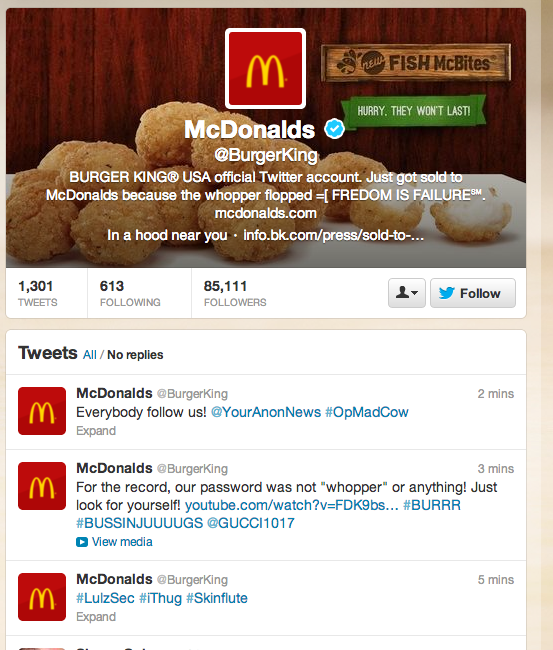WEEEEEEE! Stuff, yo! Now that we’re approaching the end of the year, it’s time to look at all the ways we got hacked, tricked, or otherwise taken advantage of in 2013.
10. The Burger King Twitter Hack
On February 18, Burger King fans woke up to find their favorite Twitter account hacked to display several offensive images and the new slogan “Fredom is Failure.” Yes, the hackers misspelled “freedom.” I guess they were smart enough to break into Burger King’s Twitter account but not to run spell check.
9. The Jeep “Whopper” Hack
The same team that hacked Burger King followed up a day later by hacking Jeep’s Twitter account, and running the same images of employees using drugs and other offensive tweets that they had posted the day before. The new slogan that they slapped onto Jeep’s Twitter? “#OpMadCow #OpWhopper.” Come on, guys.
8. Twishing
“Did you see this pic of you?” Did you click the link? If you did, you fell victim to the infamous 2013 twishing hack. Even I came close, until I realized that http://tw1tter.com was not actually the real Twitter login site. Thank goodness.
7. Adobe Needs Us To Update AGAIN
Since nearly everyone in the developed world uses Adobe to read and edit PDFs, we all got that same email on October 10 letting us know that a hacker “may have obtained access to your Adobe ID and encrypted password.” This time, instead of updating Adobe itself, we all had to update our passwords.
6. The New York Times’ Syrian Electronic Army hack
In August, the Syrian Electronic Army literally took the New York Times website offline. They pulled off this sophisticated hack by sending a malicious link to the CTO of the New York Times’ DNS registrar, disguised as a routine work email. According to the Trend Micro team, this is one of the top ways that hackers are able to break into large corporations and is large part of the reason they recommend security software to protect from malicious attacks. In this case, lack of proper protection allowed the Syrian Electronic Army to defeat the Grey Lady.
5. Diane in Seat 7A
We’re still angry about this one, okay? Earlier this month, reality show producer Elan Gale live-tweeted a fight he had with a cranky passenger named Diane, who was apparently sitting in seat 7A on an unidentified flight. Turns out Diane wasn’t real. The flight wasn’t real. I’m not even sure airplanes have a seat “7A.”
4. Fox News’ Homepage
Fox News officially went forward stating that this was not a hack, that it was instead an “internal production problem.” That doesn’t change the fact that for one glorious day, anyone who visited the Fox News website was greeted by the words “WEEEEEEE! Stuff, yo!”
3. Obama Under Attack
The Syrian Electronic Army struck multiple times this year, notoriously hacking the Associated Press Twitter account to post fake news that President Obama had been badly injured after explosions at the White House. The stock market immediately fell 130 points, but bounced back soon after we all learned that President Obama was just fine.
2. Your Computer Is Kidnapped, Please Pay in Bitcoins
If you haven’t heard of the CryptoLocker hack, beware — this new hack, currently infecting computers in both the UK and the US, encrypts the files on your computer and then demands a bitcoin ransom to get the files back. The CryptoLocker hack gets users by sending fake FedEx and UPS tracking emails with dangerous attachments. Make sure to talk to your parents about avoiding this hack, because it will be easier than explaining to them what a bitcoin is.
1. My Little Malicious Pony
To top off the list, we just learned this week that hackers were able to use the Pony botnet to steal over two million passwords from Facebook, Twitter, Google, Yahoo, and other sites. Guess not all ponies are as cute and adorable as Twilight Sparkle and Pinkie Pie.













